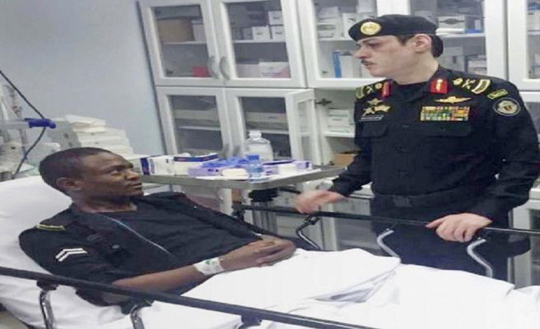Jeddah, Jan 9: The brave police officer who shot and killed two Daesh-linked terrorists has been hailed as a hero by Saudi citizens and the international media.

The UK-based Daily Mail has cited his bravery, saying that “despite the terrorists being armed with machine guns, an officer shoots them [the two terrorists] with a pistol.”
“Hero police officer shoots dead two ISIS terrorists wearing explosive belts in a dramatic gunfight captured on camera in the Saudi Arabian capital,” said the Daily Mail.
Cpl. Gibran Jaber Awagy was wounded in the dramatic shootout in Riyadh on Saturday — but said he did not even realize he was injured until afterward.
The militants were armed with Kalashnikov rifles and explosive belts. Awagy shot dead the two militants from behind a patrol car, which the two militants had tried to steal in their escape attempt.
Awagy, who is recovering in hospital, won praise for his quick actions in stopping the “most wanted” Daesh terrorist Tayea Salem bin Yaslam Al-Sayari and accomplice Talal bin Samran Al-Saedi.
On the day of the security operation in Riyadh, Cpl. Awagy was called to the scene in the Al-Yasmeen neighborhood as reinforcement. He and his colleagues immediately cordoned off the area to prevent civilians from coming close to the site and getting harmed, he told Sabq.com.
It was then that two men dressed in traditional Saudi dress came out of a house running.
“At first, I was not sure whether those running in front of me were the terrorists; they could have been neighborhood residents trying to run away from the terrorists. I was asking them to take shelter. Suddenly they started firing at me so I immediately pulled out my pistol and fired back,” he said. A local resident shot a video of the incident, which went viral on the Internet. It showed how the operation was carried out by Awagy and the death of one of the terrorists.
The video does not clearly show how the other terrorist was brought down.
But there is more to the story, as the brave police officer explained.
“I was carrying a machine gun when one of the terrorists started shooting at me and tried to carjack my police patrol vehicle. By the time the other terrorist arrived, the magazine of the machine gun was empty, so I immediately pulled out my pistol, and shot and killed him,” he said.
In the process, Awagy was shot in the leg by one of the terrorists, but that did not stop him from stopping the Daesh militants’ escape bid.
“I did not realize I was injured and bleeding until after all had finished. My top priority was to kill those terrorists and eliminate the risks they were posing,” he said.
Awagy is being treated in hospital and said he will hopefully recover with no consequences.
Soon after he was admitted to hospital, Awagy received a phone call from Crown Prince Mohammed bin Naif, who checked on his condition and conveyed King Salman’s greetings and wishes of speedy recovery.
His story has gone viral on social media and got picked up by international media outlets, praising Awagy for his heroism and putting his life on the line.
People on social media circulated the hashtag #The_Hero_Jabran_Awaji and expressed their admiration of the policeman’s bravery and heroism.
“One has to admit that when it comes to fighting crime, Saudi forces are one of the best!” said AbdulRahman Siddiqui on Facebook.
Abdulrahman Paidumama was impressed with the performance of Awagy and said, “It is not easy to face the AK47 while in your hand is just a 9mm pistol, what a brave policeman... may Allah protect you all the time.”
The perfect timing and correct use of moves impressed Mahamad Amin Shaikh “He is a real Hero. I Salute this Brave man.”
Manal Saleh felt reassured after watching the video of the policeman’s courage hunting down the terrorists in a heartbeat without thinking for a second and said, “Saudi policemen will do everything to protect all of us inside the Kingdom.”
Despite the fact that the two militants had machine guns, grenades and suicide belts, “the brave Saudi cop” — as Mohammed Sadiq Mulki described him — deserved a medal of honor. “Hats off him for his courage and bravery,” he said.
Global media outlets also praised Awagy’s quick thinking and brave actions.
The London-based Daily Mail newspaper called the police officer a “hero,” while accounts of his brave actions were also reported in The Independent newspaper, Yahoo News and numerous other outlets.
Maria Dubovikova, a leading Russian political analyst who specializes in Middle Eastern affairs, shared the video of the Riyadh encounter on her Twitter account.
“#SaudiArabian policeman armed with a pistol against two #ISIS terrorists armed with Kalashnikov. Guess who wins!” she wrote from her Twitter handle @politblogme.
Speaking to Arab News on Sunday, Dubovikova, president of the Moscow-based International Middle Eastern Studies Club (IMESClub), said she was very impressed by the professionalism and efficiency of the Saudi security forces who protect their homeland from terrorists.
“On their shoulders is a heavy burden but they bear it with responsibility and great professionalism,” she said. “People around the world should understand this; the bravery of the Saudi security forces should help clear away all the negative stereotypes of Saudi Arabia.”





Comments
Add new comment